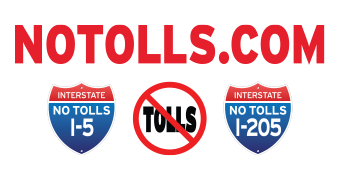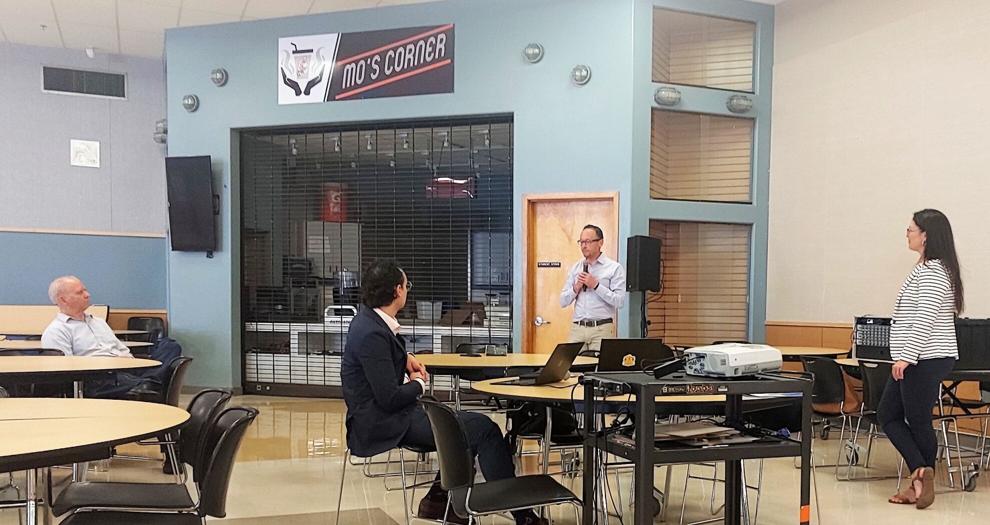Hartman: Impossible to toll I-205 bridge without causing irreparable damage
An official for Oregon’s transportation agency acknowledged that ODOT’s overly bureaucratic attitude toward tolling freeways had “missed the mark” in earning the public’s trust and creating meaningful community engagement surrounding regional traffic issues.
“We have to own a little bit that we missed the mark,” Brendan Finn, director of ODOT’s urban mobility office, told attendees of state Rep. Annessa Hartman’s town hall on May 27.
“We want to show up more like this and really talk with people, because we own it right now that we’ve been a little too bureaucratic as far as that’s concerned, and we know that this (tolling) impacts people’s lives, and we’re people too,” Finn said.
ODOT stopped short of an apology or a promise to avoid tolling in the future. Finn is still operating under the governor’s instructions for a “tolling pause” until January 2026, and discussions are already underway about what tolling would look like when implemented in two-and-a-half years.
ODOT still believes it can better “mitigate diversion” of traffic from I-205 to side streets, which Clackamas County leaders say is an impossible task because drivers will seek to avoid being tolled by instead taking neighborhood thoroughfares. Another sticking point is determining who would be eligible for an exemption on paying tolls or receive tolling discounts based on income.
“How we’re going to address equity issues, that may go beyond just creating a low-income discount program or exception program, so we look forward to those discussions and supporting them,” Finn said.
Hartman said that she’s had phone conversations with ODOT Director Kris Strickler and has invited to take him on a driving tour of Oregon City, Gladstone and West Linn. She said that he would soon realize how impossible it would be to toll the I-205 bridge without causing irreparable damage to the communities and ODOT’s reputation.
“I need him to understand the very unique situation we have down here in tolling this (I-205) artery for us, and the only other option for us to go over a very, very old bridge,” she said, referring to the area’s alternative Willamette River crossing, the 1922 Arch Bridge that has one narrow sidewalk and driving lane in each direction.
While driving around with the ODOT director, Hartman would tell him numerous stories about her constituents who rely on the bridge for basic, limited services. Examples include West Linn’s nearest public pool adjacent to downtown Oregon City, and the closest grocery store in West Linn for a large section of OC.
Hartman, a Democrat who represents Gladstone and Oregon City, says that she looks forward to a partnership with ODOT to find alternative sources for funding transportation projects rather than being “steamrolled” into a misguided tolling scheme. Both Hartman and Finn will be examining taxing vehicle miles traveled as a new funding source that might not be needed, as gas-tax revenues are increasing. ODOT had previously thought gas-tax revenues would decrease post-COVID.
“Tolling is absolutely the last option,” Hartman said of potential transportation revenue sources.
Hartman said that ODOT’s previous community engagement on tolling “has been performative,” by which she meant that state transportation officials weren’t really interested in listening to community concerns and were instead checking off a box that they had held public forums on tolling Interstate 205.
Hartman thanked Finn for speaking about ODOT’s failure to perform meaningful community engagement on proposed toll roads.
“It’s OK to acknowledge when marks have been missed… I appreciate you sharing those remarks,” Hartman told Finn during the town hall meeting.
Hartman said that Portland’s representatives in the Oregon Legislature have previously held too much sway toward tolling. So she likes how there are now only two Portland representatives and one Portland senator on ODOT’s new 10-member tolling advisory subcommittee, which includes Hartman herself.
In response to a question from Clackamas County Commissioner Paul Savas, Hartman said she would like to have this subcommittee working with an advisory workgroup that includes officials from Metro, Clackamas County, Gladstone, Oregon City and TriMet.
“It is going to be my duty to teach ODOT what meaningful community engagement looks like,” she said.
During his own separate town hall on May 24, state Sen. Mark Meek, D-Gladstone/Oregon City/Happy Valley, spoke about how he was personally silenced about opposition to tolling by fellow legislators. Hartman and Meek both sponsored bicameral and bipartisan bills to delay or limit tolling, but the co-chair of the legislative transportation committee, Rep. Susan McLain, D-Hillsboro, refused to even allow any hearings on their anti-tolling bills.
Denied a hearing on his transportation bill, Meek said he was forced to speak out as a private citizen in opposition to the transportation committee’s proposed general legislation. Meek said that McLain continued to stonewall his voice by saying that she would hear from non-legislator citizens first. After hours of waiting through all the other testimony, McLain finally called on Meek.
“Sen. Meek has been here long enough, so I guess we’re going to let him speak,” Meek quoted McLain as saying.
Hartman said that the governor finally agreed to pause tolling after 10 days of intense lobbying by all of the bipartisan Clackamas County legislators. Meek said that the governor’s order to delay tolling gives Clackamas County legislators some time to regroup for a permanent solution to ban tolls, or at the very least limit tolling’s impact.
“Luckily we have a moratorium, but that doesn’t mean that you can take your eye off the ball,” Meek said. “If you’re not at the table, then you’re on the menu.”
Meek and Hartman also both spoke about how the Republican refusal to return to the capitol is putting lots of necessary legislation in jeopardy before the constitutional deadline to finish this session by June 25.
“Real people’s lives are on the line here as issues are being held hostage,” Meek said.
Hartman said that she’s expecting the governor to have to come back with a special session just to pass the state budget, which means her legislation to help college campus survivors of sexual assault won’t get passed by the senate this year, along with hundreds of other bills in the queue. She announced that her Youth Advisory Coalition will launch this fall, with a deadline of Nov. 1 to apply, to advocate for various bills to help young people next year.


